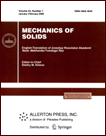 | | Mechanics of Solids
A Journal of Russian Academy of Sciences | | Founded
in January 1966
Issued 6 times a year
Print ISSN 0025-6544
Online ISSN 1934-7936 |
Archive of Issues
| Total articles in the database: | | 13427 |
| In Russian (Èçâ. ÐÀÍ. ÌÒÒ): | | 8178
|
| In English (Mech. Solids): | | 5249 |
|
| << Previous article | Volume 44, Issue 5 / 2009 | Next article >> |
| V.V. Bondarenko and V.V. Perepelkin, "Rotational-Oscillational Motions of the Nonrigid Earth about the Center of Mass," Mech. Solids. 44 (5), 677-685 (2009) |
| Year |
2009 |
Volume |
44 |
Number |
5 |
Pages |
677-685 |
| DOI |
10.3103/S0025654409050045 |
| Title |
Rotational-Oscillational Motions of the Nonrigid Earth about the Center of Mass |
| Author(s) |
V.V. Bondarenko (Moscow Aviation Institute (State University of Aerospace Technologies), Volokolamskoe sh. 4, GSP-3, A-80, Moscow, 125993 Russia)
V.V. Perepelkin (Moscow Aviation Institute (State University of Aerospace Technologies), Volokolamskoe sh. 4, GSP-3, A-80, Moscow, 125993 Russia, vadimkin1@yandex.ru) |
| Abstract |
We use the model of a nearly axisymmetric viscoelastic rigid body to study perturbed rotational-oscillational motions of the Earth's pole. We point out that the Chandler component of oscillations is of celestial-mechanics nature and is caused by the gravitational-tidal actions of the Sun and the Moon. We analyze the pole oscillation excitation mechanism at a frequency close to the Chandler frequency and show that the undamped pole oscillations are caused by the resonance harmonic of the external perturbation at a frequency close to the free nutation frequency. We discuss whether it is possible to solve the problem of constructing a short-term forecast of the pole motion on the basis of a polynomial filter obtained by the least-squares method without taking into account small-scale oscillations caused by wide-band random factors of arbitrary physical nature. In the present paper, we perform numerical simulation of tidal inhomogeneities in the Earth's axial rotation. Attention is mainly paid to the analysis of day length variations on short time intervals with periods less than or equal to one year (interannual oscillations) and to their forecast. |
| Keywords |
viscoelastic rigid body, celestial-mechanics model, the Earth pole, gravitation tide, rotations and oscillations, motion forecast |
| References |
| 1. | IERS Annual Reports.
1990 July bis 1999 July 2000.
Central Burea of IERS.
Observatoire de Paris, 2000 July 2001 bis 2002 July 2003.
Verlag BKG Frankfurt am Mein
(ftp://hpiers.obspm.fr/iers/eop/eopc04/). |
| 2. | W. H. Munk and G. J. F. MacDonald,
The Rotation of the Earth
(Cambridge University Press, Cambridge 1960; Mir, Moscow, 1964). |
| 3. | L. D. Akulenko, S. A. Kumakshev, Yu. G. Markov, and L. V. Rykhlova,
"A Gravitational-Tidal Mechanism for the Earth's Polar Oscillations,"
Astron. Zh.
82 (10), 950-960 (2005)
[Astron. Rep. (Engl. Transl.)
49 (10), 847-857 (2005)]. |
| 4. | V. V. Bondarenko and V. V. Perepelkin,
"Simulation and Analysis of the Earth's Polar Oscillations,"
Izv. Akad. Nauk. Mekh. Tverd. Tela,
No. 2, 28-35 (2007)
[Mech. Solids (Engl. Transl.)
42 (2), 190-196 (2007)]. |
| 5. | L. D. Akulenko, Yu. G. Markov, and V. V. Perepelkin,
"Modeling the Earth-Pole Motion for a Short Period of Time,"
Dokl. Ross. Akad. Nauk
426 (1), 41-46 (2009)
[Dokl. Phys. (Engl. Transl.)
54 (5), 233-237 (2009)]. |
| 6. | G. M. Chernyavskii and A. A. Chernov,
Laser Systems in Space (Information Technology)
(Radio i Svyaz', Moscow, 1995)
[in Russian]. |
| 7. | V. S. Gubanov,
Generalized Least Squares Method.
Theory and Applications in Astrometry
(Nauka, St. Petersburg, 1997)
[in Russian]. |
| 8. | L. D. Akulenko, Yu. G. Markov, and V. V. Perepelkin,
"Nonuniformities of the Earth's Rotation,"
Dokl. Ross. Akad. Nauk
417 (4), 483-488 (2007)
[Dokl. Phys. (Engl. Transl.)
52 (12), 681-686 (2007)]. |
|
| Received |
17 November 2006 |
| Link to Fulltext |
|
| << Previous article | Volume 44, Issue 5 / 2009 | Next article >> |
|
 If you find a misprint on a webpage, please help us correct it promptly - just highlight and press Ctrl+Enter If you find a misprint on a webpage, please help us correct it promptly - just highlight and press Ctrl+Enter
|
|

 Russian
Russian  English
English